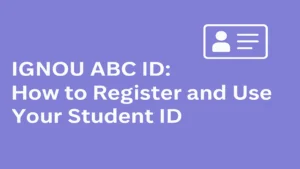Introduction: Understanding IGNOU Assignment Evaluation
Overview of IGNOU Assignment Evaluation Process
In the distance education model of the Indira Gandhi National Open University (IGNOU), assignments play a pivotal role in evaluating a student’s understanding and knowledge. Unlike traditional universities where exams dominate the final grade, IGNOU relies heavily on assignments as a means of assessing students’ learning progress throughout the semester. These assignments account for a significant percentage of your final grade, and proper understanding of the evaluation process can be the key to scoring well.
Why It’s Crucial to Understand What Examiners Look For
Knowing exactly what examiners are looking for when grading your IGNOU assignments can make a massive difference in the marks you receive. If you can align your work with the specific expectations and guidelines provided by IGNOU, you not only stand a better chance of scoring higher but also avoid common mistakes that could cost you valuable marks. Understanding the expectations helps you craft assignments that reflect your knowledge and ability in the most effective way.
Key Criteria in IGNOU Assignment Evaluation
Clarity of Expression
When you submit your assignments, examiners assess not just the content but also how clearly you communicate your ideas. Poorly structured or difficult-to-read assignments will likely lower your grade. Clarity of expression involves using straightforward language, avoiding unnecessary jargon, and ensuring that your points are well-organized.
- Tip: Always proofread your work to make sure your arguments are clear and concise.
Relevance to the Question
One of the most critical aspects of any IGNOU assignment is staying on topic. Examiners want to see that you have understood the question and are addressing it directly, without going off-topic. When writing, make sure every point you make is relevant to the question and adds value to your answer.
- Tip: Highlight keywords from the assignment question and use them in your answer to stay focused.
Depth of Knowledge
Merely summarizing information will not help you secure high marks. Examiners look for depth of knowledge in your answers. This means that your answers should reflect a thorough understanding of the subject matter, not just superficial facts. Providing examples, explaining theories, and offering detailed answers will showcase your knowledge.
- Tip: Don’t hesitate to explore the topic beyond the basic syllabus; demonstrate a deeper understanding.
Critical Thinking and Analysis
Critical thinking is one of the key elements examiners assess in your assignments. They look for your ability to analyze different viewpoints, present balanced arguments, and evaluate evidence effectively. Instead of just stating facts, you should aim to critically engage with the material and present your own insights.
- Tip: Always support your arguments with logical reasoning and evidence from credible sources.
Formatting and Presentation
Proper Structure
A well-structured assignment is easier to follow and shows that you’ve put thought into your work. Use headings and subheadings to break up the content and create a logical flow of ideas. Proper introduction, body, and conclusion are essential.
- Tip: Start with an introduction that briefly outlines the answer, then develop your arguments in the body, and conclude with a summary of your key points.
Legibility and Neatness
Whether your assignment is handwritten or typed, legibility matters. Poor handwriting or an untidy document will distract the examiner and could lead to misunderstandings. If your assignment is handwritten, ensure your handwriting is clear and neat. For typed assignments, use a readable font like Times New Roman or Arial with a font size of 12.
- Tip: Leave enough space between paragraphs, and use bullet points or numbered lists for clarity.
Adherence to Word Limit
In IGNOU assignments, adhering to the word limit is crucial. It’s not just about filling the pages but about providing relevant information in a concise manner. Being precise in your answers shows that you can communicate effectively within the constraints of the assignment.
- Tip: Stay within the word limit while ensuring you cover all the key points.
Citation and Referencing: Essential for Academic Integrity
Correct Use of References
Proper referencing is a must in IGNOU assignments. The use of correct citations shows that you’ve done research and are acknowledging the work of others. It also enhances the credibility of your assignment. IGNOU often requires the use of specific citation styles like APA, MLA, or Harvard.
- Tip: Always double-check your references and ensure you are following the prescribed referencing style.
Incorporating External Sources
To back up your arguments, it’s essential to use credible external sources. Textbooks, academic journals, and credible websites are all excellent sources of information. Including case studies or real-world examples can further strengthen your answer.
- Tip: Ensure that all external sources are properly cited to avoid plagiarism.
Avoiding Plagiarism
Plagiarism can severely impact your assignment marks. Copy-pasting content from the internet without proper acknowledgment is a serious offense. To avoid plagiarism, always paraphrase information in your own words and properly cite your sources.
- Tip: Use plagiarism-check tools to ensure that your work is original.
Answering the Question Effectively
Understanding the Question
Before you begin writing, take the time to carefully analyze the question. Understand what the examiner is asking. Are they asking for an opinion, a detailed explanation, or a comparison? Breaking down the question into parts will help you focus your answer effectively.
- Tip: Underline key terms in the question and ensure that each part of the question is addressed in your answer.
Creating an Answer Outline
Creating an outline before writing can significantly improve the quality of your assignment. Outlining your answer helps you organize your thoughts and ensures you don’t miss any important points.
- Tip: Break the assignment into sections, and assign a rough word count for each section to stay within the limit.
Comprehensive and Concise Answers
While it’s important to provide enough detail, it’s equally essential to be concise. Avoid unnecessary information or long-winded explanations. Focus on answering the question in a clear, straightforward manner.
- Tip: Write answers that are both comprehensive and to the point. Avoid adding irrelevant details.
The Role of Practical Knowledge in IGNOU Assignments
Application of Theoretical Knowledge
In many assignments, applying theory to practice can significantly boost your marks. For example, if you’re studying business, showcasing how a particular theory can be applied in the real world makes your answer much more impactful.
- Tip: Always tie theoretical concepts back to practical examples when possible.
Incorporating Case Studies or Examples
Using case studies or real-world examples to support your answers demonstrates that you can apply the concepts learned in the syllabus to actual situations.
- Tip: Make sure the examples you choose are relevant to the question and are from credible sources.
Time Management: Key to High-Quality Assignments
Importance of Starting Early
Starting your assignments early gives you the time to research thoroughly, plan effectively, and revise your work. Procrastination often leads to rushed assignments, which usually results in poor-quality submissions.
- Tip: Set aside specific hours each day for working on your assignments to avoid last-minute stress.
Dividing Time Between Research and Writing
Proper time management requires dividing your time wisely between research and writing. Research helps you gather essential information, while writing requires you to organize that information logically. Allocate sufficient time for both activities to ensure a balanced approach.
- Tip: Spend at least 30% of your time on research, and use the remaining time for writing and revising.
Final Review and Proofreading
Once you’ve written your assignment, make sure to set aside time for proofreading. Checking for grammatical errors, spelling mistakes, and formatting issues is crucial to ensure your work is polished.
- Tip: Read your assignment aloud to catch any errors you may have missed while reading silently.
Common Mistakes to Avoid in IGNOU Assignments
Ignoring Guidelines and Instructions
One of the most common mistakes students make is ignoring the guidelines provided by IGNOU for their assignments. These guidelines are not just recommendations; they are there to help you align your work with the university’s expectations. Whether it’s the word limit, the format, or the referencing style, adhering to the instructions is critical for scoring well.
- Tip: Always refer to the assignment guidelines before you start writing to ensure you’re following them correctly.
Lack of Proper Planning
Failing to plan your assignment can lead to a disorganized structure, incomplete answers, and a rushed submission. Not planning your time and research properly often results in missed deadlines and lower-quality work.
- Tip: Start with an outline and make a plan for each section of the assignment before you begin writing.
Overloading with Information
Sometimes students try to include as much information as possible, thinking that more content equals higher marks. However, this approach often leads to irrelevant or off-topic content. Examiners prefer focused, concise answers that directly address the question.
- Tip: Stay relevant and limit your content to what directly answers the question.
Relying Solely on One Source
Many students rely on a single textbook or source for their assignments. While textbooks are valuable, using only one source may limit your perspective and may not provide enough depth.
- Tip: Use a variety of credible sources to back up your arguments, such as research papers, journals, and credible websites.
How to Stand Out in Your IGNOU Assignment
Adding Personal Insights and Opinions
To make your assignment stand out, incorporate your personal insights and critical opinions on the subject matter. Examiners appreciate when students provide unique perspectives or interpretations of the material.
- Tip: Justify your opinions with solid reasoning and evidence from your research.
Using Visual Aids to Support Your Answer
In some cases, using visual aids like tables, graphs, or diagrams can make your answer more engaging and easier to understand. These tools can help convey complex information in a simple and clear manner.
- Tip: Only use visuals that are relevant to the content and add value to your answer. Ensure they are labeled correctly.
Providing Comprehensive Examples
Examples can significantly enhance the quality of your answers, especially if you can demonstrate how theoretical concepts apply in real-world scenarios. Case studies or examples from the news or research papers make your work more relevant and grounded in practical knowledge.
- Tip: Try to use current examples or case studies that illustrate the subject matter in real life.
The Role of Consistency in Assignment Writing
Maintaining Consistent Formatting
Consistency in formatting ensures that your assignment is easy to read and professional in appearance. Consistent font sizes, heading styles, and spacing help create a cohesive document.
- Tip: Stick to one formatting style throughout your assignment. If you’re unsure, refer to IGNOU’s guidelines.
Consistency in Referencing Style
Using a consistent referencing style throughout your assignment is crucial for academic integrity. Inconsistent referencing can confuse the examiner and may lead to a loss of marks.
- Tip: Choose one citation style (e.g., APA, MLA) and use it consistently across all your references.
Consistent Argumentation and Flow
Your argument should flow logically from one point to the next. Avoid jumping between ideas or making unrelated points. Logical consistency in presenting your arguments will make your assignment easier to follow and strengthen your case.
- Tip: Make sure each paragraph builds upon the previous one and that the overall structure follows a coherent path.
The Importance of Revising Your IGNOU Assignment
Why Revision is Essential
Revision is one of the most crucial steps in creating an effective assignment. It allows you to catch errors you may have missed initially, clarify vague points, and polish your arguments.
- Tip: Leave time for a final revision after writing the first draft. Set it aside for a few hours or even a day if possible, and then read it with fresh eyes.
Common Areas to Focus on During Revision
While revising, focus on the following areas:
- Grammar and Spelling: Check for any language errors or typos.
- Clarity: Ensure all points are clear and logically structured.
- Citations: Double-check that your references are correctly formatted and complete.
- Tip: Consider using tools like Grammarly to catch grammar and spelling errors or a plagiarism checker to ensure originality.
Getting Feedback
If possible, ask peers or mentors to review your assignment before submission. Constructive feedback can highlight areas where your work might need improvement or where your argument may need further strengthening.
- Tip: Approach a friend who is familiar with the subject to provide feedback.
Final Thoughts on IGNOU Assignment Success
The Role of Consistency and Effort
Achieving success in IGNOU assignments isn’t about quick fixes or last-minute efforts. It’s about consistent effort and aligning your work with the academic expectations of the university. By dedicating time to thoroughly researching the topic, presenting your answers clearly, and adhering to proper guidelines, you’re setting yourself up for success.
Long-Term Benefits of Good Assignment Practices
Developing strong assignment-writing habits can benefit you beyond just getting marks. The skills you build – critical thinking, research abilities, and communication – are all transferable to your future academic and professional endeavors. Whether you continue with higher education or enter the workforce, these are the skills that will set you apart.
Encouragement for All Students
Finally, don’t be disheartened if some assignments don’t go as planned. Every experience is an opportunity to learn and grow. Take feedback positively, implement it, and continue refining your approach. The more you work on improving your assignment skills, the better you’ll become at delivering high-quality work.
Additional Resources for IGNOU Students
For further assistance with your assignments, here are some resources that can help:
- IGNOU Online Library: A vast collection of materials, journals, and books relevant to your courses.
- Assignment Submission Portal: For information on submission deadlines and guidelines.
- Peer Study Groups: Join online forums or local study groups to discuss topics and get advice from fellow students.
- IGNOU Support Centers: In case you need direct help with understanding specific assignments or subjects.
Conclusion: How to Maximize Your IGNOU Assignment Marks
Aligning With Examiners’ Expectations
To maximize your chances of getting high marks, always align your assignment with the key criteria examiners look for: clarity, depth of knowledge, relevance, and critical analysis. Pay attention to formatting, referencing, and structuring your work properly.
The Long-Term Impact of Quality Assignments
Remember, assignments are not just about getting marks for the semester; they also build your understanding of the subject. Consistently submitting high-quality assignments will improve your learning experience and prepare you for the final exams.
Final Thoughts
By following the strategies and tips discussed above, you can ensure that your IGNOU assignments stand out and meet the expectations of the examiners. Stay organized, start early, and focus on delivering well-researched, clear, and insightful content. These habits will not only help you excel in your assignments but also enhance your overall academic performance.
FAQs
What is the weightage of assignments in IGNOU exams?
Assignments in IGNOU typically account for 30% to 40% of the total marks for a course, depending on the subject. However, this varies from program to program.
How can I improve my assignment writing skills for IGNOU?
To improve your skills, focus on understanding the key concepts, practicing writing regularly, and revising your work before submission. You can also seek feedback from peers or mentors.
Are there any common errors I should avoid in IGNOU assignments?
Common mistakes include ignoring guidelines, not staying on topic, improper citation, poor grammar, and submitting late work. Always plan ahead and follow the instructions carefully.
Can I submit a typed assignment instead of a handwritten one?
Yes, IGNOU allows typed assignments. However, ensure you follow the prescribed format and use a readable font, such as Times New Roman, size 12.
How do I handle multiple assignments in a short time?
Managing multiple assignments requires good time management skills. Break down your tasks, prioritize according to deadlines, and allocate specific time blocks for each assignment.
Related Posts:
- Top 5 Best IGNOU Courses for 2025: Unlocking Career Opportunities
- IGNOU iGRAM 2025: Best Comprehensive Guide to the Digital Grievance Redressal Portal
- IGNOU Exam Date 2025: Stay Prepared With Comprehensive Guide
- IGNOU MA Admission 2025: A Comprehensive Guide For Students
- IGNOU Exam Form Fill-Up 2025: A Comprehensive Guide




